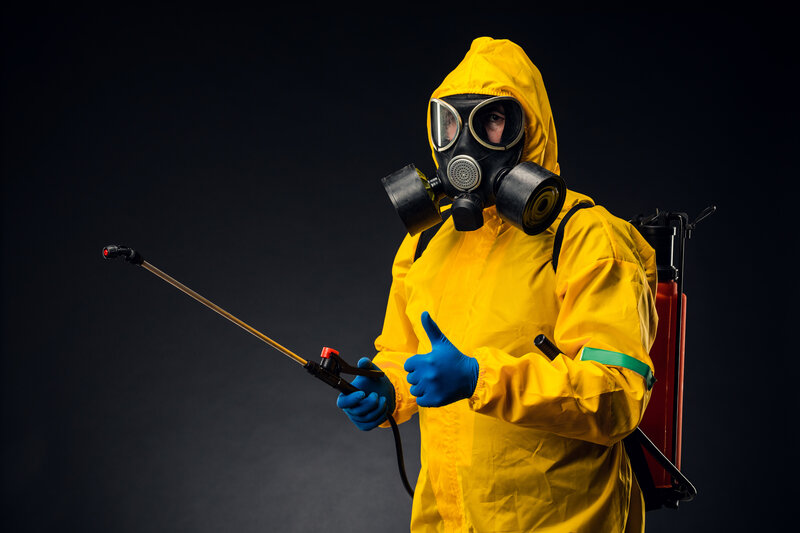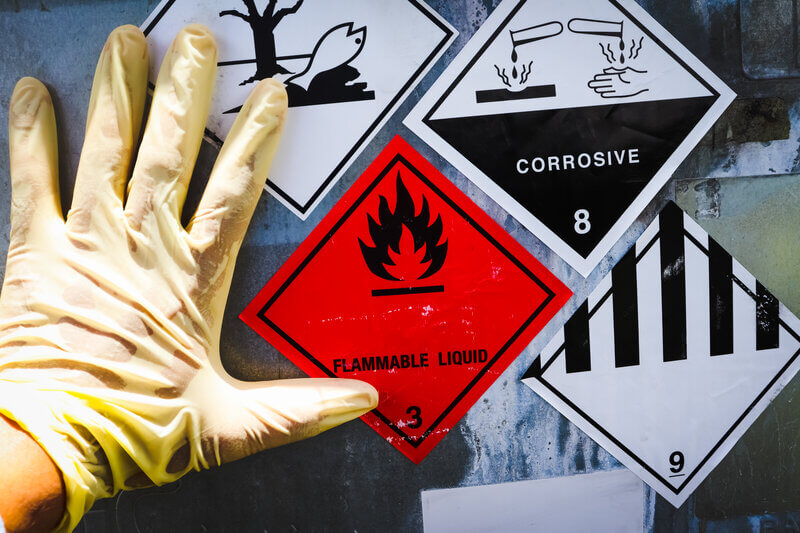Working in the industrial cleaning industry isn’t like a regular job. It isn’t even like a regular cleaning job. Industrial cleaning uses chemicals and equipment that are more potent and powerful than what you would find in your local supermarket.
Storing, handling and disposing of these chemical substances come with challenges. This is why anyone using them must be educated, trained and qualified in their use.
What constitutes hazardous substances?
Often used interchangeably with “dangerous goods” or “hazardous substances”, hazardous materials are substances that pose a potential risk to human health, property or the environment. These substances can take many forms, from explosives such as fireworks and dynamite to biological agents like bacteria or viruses.
In the industrial cleaning industry, we mainly deal with hazardous materials like chemicals like acids and solvents, compressed gasses like oxygen and propane, and flammable materials like petrol and oil.
What the government says about cleaning chemicals
The United Nations has developed a system for classifying hazardous materials based on their physical and chemical properties. This system is used by regulatory agencies around the world, including the New Zealand government.
The regulation of hazardous substances sits under the Health and Safety at Work Act. This determines their proper handling, storage, and transportation. As you can imagine, there are strict rules and guidelines, as well as requirements for those who wish to become legally certified.

Safe handling of cleaning chemicals
Proper handling of cleaning chemicals is essential to ensure the health and safety of those who use them. Safe handling procedures can help to prevent accidents, injuries and exposure to hazardous materials, which may result in long-term health issues.
Everyone must wear personal protective equipment (PPE) when handling chemicals. Protective goggles and gloves are the bare minimum, but respirators and full protective clothing are standard.
When handling cleaning chemicals, it is essential to use proper procedures to minimise the risk of spills or accidents. This may include something as simple as using a funnel or spout to pour liquids or using a cart to transport heavier containers.
Proper ventilation is essential to minimise exposure to hazardous chemicals when using cleaning products. A well-ventilated area is essential to create adequate airflow and prevent the build-up of fumes.
It is also important to ensure that any spills or accidents are promptly cleaned up and that waste products are disposed of properly. In the event of a spill, a professional spill kit should be used to clean up. The usual “wipe with a cloth” solution we would do at home is not suitable for these chemicals.
Safe storage of cleaning chemicals
Storing chemicals is just as important as handling them. Improper storage can lead to accidents, spills, or exposure to hazardous materials.
Most cleaning products should be stored in a cool, dry, and well-ventilated area. This prevents the build-up of fumes to reduce the risk of fire or explosion. Containers must be appropriate to the chemicals within, tightly closed and labelled clearly and correctly.
Certain chemicals can react with each other, so it’s important to separate incompatible materials to avoid fires, toxic gases or even explosions. And, of course, all dangerous substances should be kept in a secure location out of reach of children and pets.
Disposable of cleaning chemicals
Using and storing hazardous substances is one thing, but what do you do with them after you’re finished? If these substances are not disposed of properly, they can contaminate soil, water, and air and cause long-term harm to people and the environment.
In many cases, only trained and qualified professionals can dispose of hazardous materials. There are, of course, many laws and regulations regarding the disposal of dangerous substances. It is everyone’s responsibility to remove these substances properly and ensure a safe and healthy environment for all.

Don’t take the risk; call the professionals
Using, storing and disposing of hazardous substances can be dangerous to workers, the public and the environment.
Only professionals who have been trained and certified in hazardous material handling are qualified to do so. The use of industrial cleaning chemicals should not be taken lightly or considered a DIY job.
The PREQUAL qualification is a standard to identify competent Health and Safety practices in workplaces around New Zealand. We’re proud to say Rapid Facilities are PREQUAL certified.
PREQUAL pre-qualification allows contractors to demonstrate that their health and safety management systems have been independently assessed, providing an initial indication of their ability to perform work safely.
It combines the experience and expertise of some of New Zealand’s leading Health and Safety practitioners to provide an effective and affordable cross-industry contractor pre-qualification service. PREQUAL is bench-marked against both international best practices and local experience.
Safety is our main priority here, and it should be yours too. When it comes to the handling and storage of industrial cleaning chemicals and other hazardous materials, don’t take any risks. Call the professionals. Call us.

